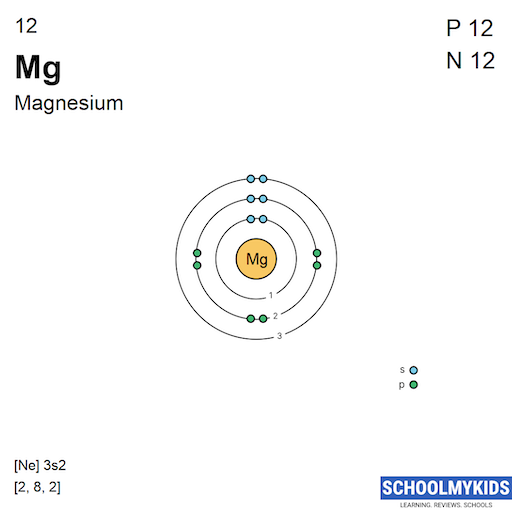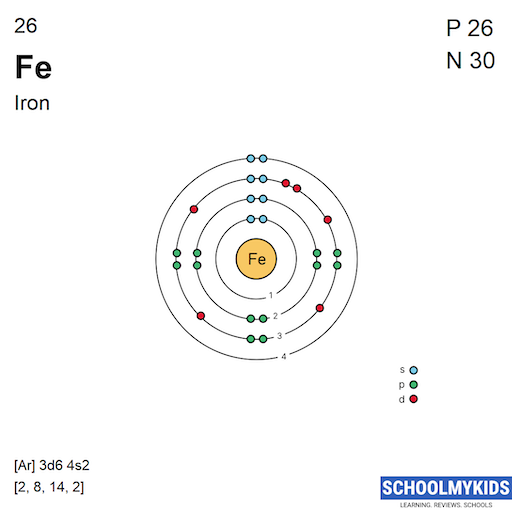Periodic Table Element Comparison: Compare Elements - Magnesium vs Iron
Compare Magnesium and Iron on the basis of their properties, attributes and periodic table facts. Compare elements on more than 90 properties. All the elements of similar categories show a lot of similarities and differences in their chemical, atomic, physical properties and uses. These similarities and dissimilarities should be known while we study periodic table elements. You can study the detailed comparison between Magnesium vs Iron with most reliable information about their properties, attributes, facts, uses etc. You can compare Mg vs Fe on more than 90 properties like electronegativity , oxidation state, atomic shells, orbital structure, Electronaffinity, physical states, electrical conductivity and many more. Magnesium and Iron comparison table on more than 90 properties.
Magnesium and Iron Comparison
Facts
| Name | Magnesium | Iron |
|---|---|---|
| Atomic Number | 12 | 26 |
| Atomic Symbol | Mg | Fe |
| Atomic Weight | 24.305 | 55.845 |
| Phase at STP | Solid | Solid |
| Color | Silver | Gray |
| Metallic Classification | Alkaline Earth Metal | Transition Metal |
| Group in Periodic Table | group 2 | group 8 |
| Group Name | beryllium family | iron family |
| Period in Periodic Table | period 3 | period 4 |
| Block in Periodic Table | s -block | d -block |
| Electronic Configuration | [Ne] 3s2 | [Ar] 3d6 4s2 |
| Electronic Shell Structure (Electrons per shell) | 2, 8, 2 | 2, 8, 14, 2 |
| Melting Point | 923 K | 1811 K |
| Boiling Point | 1363 K | 3134 K |
| CAS Number | CAS7439-95-4 | CAS7439-89-6 |
| Neighborhood Elements | Neighborhood Elements of Magnesium | Neighborhood Elements of Iron |
History
| Parameter | Magnesium | Iron |
|---|---|---|
| History | The element Magnesium was discovered by J. Black in year 1755 in United Kingdom. Magnesium derived its name from Magnesia, a district of Eastern Thessaly in Greece. | The element Iron was discovered by Unknown in year Before 5000 BCE. Iron derived its name from English word (ferrum in Latin). |
| Discovery | J. Black (1755) | Unknown (Before 5000 BCE) |
| Isolated | H. Davy (1808) | Egypt (4000 BCE) |
Presence: Abundance in Nature and Around Us
Parts per billion (ppb) by weight / by atoms (1ppb =10^-7 %)
| Property | Magnesium | Iron |
|---|---|---|
| Abundance in Universe | 600000 / 30000 | 1100000 / 20000 |
| Abundance in Sun | 700000 / 30000 | 1000000 / 30000 |
| Abundance in Meteorites | 120000000 / 100000000 | 220000000 / 77000000 |
| Abundance in Earth's Crust | 29000000 / 25000000 | 63000000 / 23000000 |
| Abundance in Oceans | 1326000 / 337000 | 3 / 0.33 |
| Abundance in Humans | 270000 / 70000 | 60000 / 6700 |
Crystal Structure and Atomic Structure
| Property | Magnesium | Iron |
|---|---|---|
| Atomic Volume | 13.984 cm3/mol | 7.0923 cm3/mol |
| Atomic Radius | 145 pm | 156 pm |
| Covalent Radius | 130 pm | 125 pm |
| Van der Waals Radius | 173 pm | - |
Atomic Spectrum - Spectral Lines | ||
| Emission Spectrum |  |  |
| Absorption Spectrum |  |  |
| Lattice Constant | 320.94, 320.94, 521.08 pm | 286.65, 286.65, 286.65 pm |
| Lattice Angle | π/2, π/2, 2 π/3 | π/2, π/2, π/2 |
| Space Group Name | P63/mmc | Im_ 3m |
| Space Group Number | 194 | 229 |
| Crystal Structure | Simple Hexagonal  | Body Centered Cubic  |
Atomic and Orbital Properties
| Property | Magnesium | Iron |
|---|---|---|
| Atomic Number | 12 | 26 |
| Number of Electrons (with no charge) | 12 | 26 |
| Number of Protons | 12 | 26 |
| Mass Number | 24.305 | 55.845 |
| Number of Neutrons | 12 | 30 |
| Shell structure (Electrons per energy level) | 2, 8, 2 | 2, 8, 14, 2 |
| Electron Configuration | [Ne] 3s2 | [Ar] 3d6 4s2 |
| Valence Electrons | 3s2 | 3d6 4s2 |
| Oxidation State | 2 | 2, 3 |
| Atomic Term Symbol (Quantum Numbers) | 1S0 | 5D4 |
| Shell structure |  |  |
Isotopes and Nuclear Properties
Magnesium has 3 stable naturally occuring isotopes while Iron has 4 stable naturally occuring isotopes.
| Parameter | Magnesium | Iron |
|---|---|---|
| Known Isotopes | 19Mg, 20Mg, 21Mg, 22Mg, 23Mg, 24Mg, 25Mg, 26Mg, 27Mg, 28Mg, 29Mg, 30Mg, 31Mg, 32Mg, 33Mg, 34Mg, 35Mg, 36Mg, 37Mg, 38Mg, 39Mg, 40Mg | 45Fe, 46Fe, 47Fe, 48Fe, 49Fe, 50Fe, 51Fe, 52Fe, 53Fe, 54Fe, 55Fe, 56Fe, 57Fe, 58Fe, 59Fe, 60Fe, 61Fe, 62Fe, 63Fe, 64Fe, 65Fe, 66Fe, 67Fe, 68Fe, 69Fe, 70Fe, 71Fe, 72Fe |
| Stable Isotopes | Naturally occurring stable isotopes: 24Mg, 25Mg, 26Mg | Naturally occurring stable isotopes: 54Fe, 56Fe, 57Fe, 58Fe |
| Neutron Cross Section | 0.063 | 2.56 |
| Neutron Mass Absorption | 0.0001 | 0.0015 |
Chemical Properties: Ionization Energies and electron affinity
| Property | Magnesium | Iron |
|---|---|---|
| Valence or Valency | 2 | 3 |
| Electronegativity | 1.31 Pauling Scale | 1.83 Pauling Scale |
| Electron Affinity | 0 kJ/mol | 15.7 kJ/mol |
| Ionization Energies | 1st: 737.7 kJ/mol 2nd: 1450.7 kJ/mol 3rd: 7732.7 kJ/mol 4th: 10542.5 kJ/mol 5th: 13630 kJ/mol 6th: 18020 kJ/mol 7th: 21711 kJ/mol 8th: 25661 kJ/mol 9th: 31653 kJ/mol 10th: 35458 kJ/mol 11th: 169988 kJ/mol 12th: 189368 kJ/mol | 1st: 762.5 kJ/mol 2nd: 1561.9 kJ/mol 3rd: 2957 kJ/mol 4th: 5290 kJ/mol 5th: 7240 kJ/mol 6th: 9560 kJ/mol 7th: 12060 kJ/mol 8th: 14580 kJ/mol 9th: 22540 kJ/mol 10th: 25290 kJ/mol 11th: 28000 kJ/mol 12th: 31920 kJ/mol 13th: 34830 kJ/mol 14th: 37840 kJ/mol 15th: 44100 kJ/mol 16th: 47206 kJ/mol 17th: 122200 kJ/mol 18th: 131000 kJ/mol 19th: 140500 kJ/mol 20th: 152600 kJ/mol 21st: 163000 kJ/mol 22nd: 173600 kJ/mol 23rd: 188100 kJ/mol 24th: 195200 kJ/mol 25th: 851800 kJ/mol 26th: 895161 kJ/mol |
Physical Properties
| Property | Magnesium | Iron |
|---|---|---|
| Density | 1.738 g/cm3 | 7.874 g/cm3 |
| Molar Volume | 13.984 cm3/mol | 7.0923 cm3/mol |
Elastic Properties | ||
| Young Modulus | 45 | 211 |
| Shear Modulus | 17 GPa | 82 GPa |
| Bulk Modulus | 45 GPa | 170 GPa |
| Poisson Ratio | 0.29 | 0.29 |
Hardness - Tests to Measure of Hardness of Element | ||
| Mohs Hardness | 2.5 MPa | 4 MPa |
| Vickers Hardness | - | 608 MPa |
| Brinell Hardness | 260 MPa | 490 MPa |
Electrical Properties | ||
| Electrical Conductivity | 23000000 S/m | 10000000 S/m |
| Resistivity | 4.4e-8 m Ω | 9.7e-8 m Ω |
| Superconducting Point | - | - |
Heat and Conduction Properties | ||
| Thermal Conductivity | 160 W/(m K) | 80 W/(m K) |
| Thermal Expansion | 0.0000082 /K | 0.0000118 /K |
Magnetic Properties | ||
| Magnetic Type | Paramagnetic | Ferromagnetic |
| Curie Point | - | 1043 K |
| Mass Magnetic Susceptibility | 6.9e-9 m3/kg | - |
| Molar Magnetic Susceptibility | 1.68e-10 m3/mol | - |
| Volume Magnetic Susceptibility | 0.000012 | - |
Optical Properties | ||
| Refractive Index | - | - |
Acoustic Properties | ||
| Speed of Sound | 4602 m/s | 4910 m/s |
Thermal Properties - Enthalpies and thermodynamics
| Property | Magnesium | Iron |
|---|---|---|
| Melting Point | 923 K | 1811 K |
| Boiling Point | 1363 K | 3134 K |
| Critical Temperature | - | - |
| Superconducting Point | - | - |
Enthalpies | ||
| Heat of Fusion | 8.7 kJ/mol | 13.8 kJ/mol |
| Heat of Vaporization | 128 kJ/mol | 347 kJ/mol |
| Heat of Combustion | -668 J/(kg K) | - |
Regulatory and Health - Health and Safety Parameters and Guidelines
| Parameter | Magnesium | Iron |
|---|---|---|
| CAS Number | CAS7439-95-4 | CAS7439-89-6 |
| RTECS Number | - | RTECSNO4565500 |
| DOT Hazard Class | 4.1 | 4.1 |
| DOT Numbers | {1869,1418} | 3089 |
| EU Number | - | - |
| NFPA Fire Rating | 1 | 1 |
| NFPA Health Rating | 0 | 1 |
| NFPA Reactivity Rating | 1 | 0 |
| NFPA Hazards | - | - |
| AutoIgnition Point | 472 °C | 100 °C |
| Flashpoint | 500 °C | - |
Compare With Other Elements
Compare Magnesium and Iron with other elements of the periodic table.

